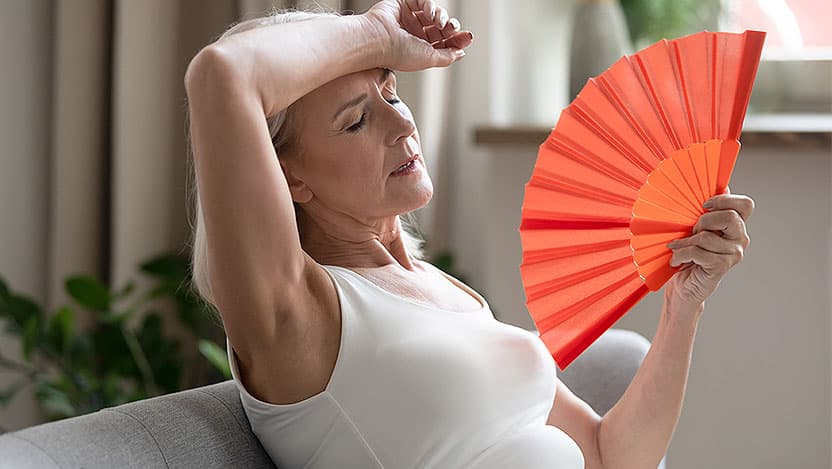Managing menopause symptoms: Tips to help with hot flashes, weight gain, hair loss and more

Menopause is the natural end to the menstrual cycle, when the ovaries stop producing estrogen and progesterone. Some will experience menopause naturally. For others, menopause will result from surgical removal of the ovaries, or because of medical treatments or genetic disorders that stop ovarian function.
The decline of those hormones in the body can cause unpleasant side effects ranging from hot flashes and night sweats to weight gain and more. No experience is the same. Some will have severe symptoms, while others will only experience mild changes.
The menopause transition doesn’t have to be horrible. Because of the bothersome symptoms, often menopause is feared; however, it shouldn’t be. It’s just a different phase of life. Menopause isn’t good or bad — it just is. And if you're struggling with symptoms, you shouldn’t be afraid to ask your doctor about treatment options. At the University of Chicago Medicine, a custom care plan is created for each individual based on their symptoms, medical history and personal preferences.
Here are answers to some common questions patients ask about menopause.
What age does menopause start?
While the average age is 51, the majority will go through menopause between ages 40 and 58. There’s a transition period, called perimenopause, when you may have menopause symptoms but still have a menstrual cycle. Perimenopausal symptoms can start up to seven years before the menstrual cycle stops.Premature menopause occurs before age 40. If you think you may be experiencing premature menopause, ask your doctor about hormone replacement therapy to help prevent cardiovascular disease and protect bone health.
How do you know if you are in menopause?
The main indicator that you're in menopause is going a full year without a menstrual period.What are the physical side effects of menopause?
Hot flashes, night sweats, vaginal dryness, hair loss, weight gain (especially around the midsection), skin changes, arthralgias (joint pain), sleep disruption and loss of muscle tone are all common. You don’t have to live with the discomfort, though. There are treatment options, including lifestyle modifications, that can help improve bothersome symptoms. I ask my patients about their most bothersome symptoms, and then we talk about those things and how to manage them so they can feel better.What can be done to minimize the weight gain caused by menopause?
There are ways to help minimize weight gain during menopause. Start adopting healthy lifestyle practices before menopause by exercising and eating well, so those good habits are in place. Aging is associated with changes in metabolism, decreased muscle and increased body fat. We are often less physically active the older we get, which is a large contributor to weight gain. Weight tends to deposit around the midsection, which can increase the risk of diabetes, high cholesterol, cardiovascular disease, osteoarthritis and certain types of cancer (breast, uterine and colon). In addition to the negative impact on health, weight gain often leads to poor self-image and depression.
It is important to your overall health and well-being to adhere to a healthy diet and engage in regular physical activity. A healthy diet includes watching portion control and limiting amounts of sugar, processed carbohydrates, fat and processed foods. The Mediterranean diet has been shown to help with weight loss, improve cognition and decrease the risk of dementia and osteoporosis, as well as improve heart health. Weight-bearing exercises such as walking, Pilates and yoga help maintain posture, balance and core strength.
In addition, it is vital to control stress and mental wellness, because stress can make other menopausal symptoms worse. Cognitive behavioral therapy can help keep stress under control. So can things like Pilates, acupuncture and yoga, which can calm the brain and nervous system, help people tune in to their breathing and be aware of the present moment. People who have these healthy habits have better control of weight gain and overall health through the menopause transition.
What does a hot flash feel like?
Many describe hot flashes as a sudden feeling of warmth, usually from the nipple line up, associated with sweating. Some individuals also experience an increase in heart rate during hot flashes. Night sweats are hot flashes that occur during sleep, often causing sweating episodes severe enough to soak through clothing and bedding. Hot flashes and night sweats can range from mild to severe in discomfort and frequency.What causes hot flashes and night sweats?
Hot flashes and night sweats happen during perimenopause and menopause because hormonal changes disrupt the way your brain regulates body heat. It is unknown why some individuals experience worse vasomotor symptoms (hot flashes and night sweats) than others during menopause.When should I worry about hot flashes and night sweats?
If hot flashes and night sweats become disruptive to your quality of life, talk with your doctor about your symptoms. There are several treatment options that may help, including behavioral therapy, non-hormonal medications and hormone therapy.Does menopause cause hair loss?
Hormonal changes due to menopause can contribute to hair loss. The most common causes of sudden rapid hair loss, or telogen effluvium, are stress and fluctuating hormones that occur during the menopause transition. Female pattern hair loss is also very common. It is more prevalent after menopause because hormones play a role. Underlying medical conditions, heredity and certain styling practices may also influence hair loss.To help prevent hair loss, adhere to a well-balanced diet. Certain supplements (iron, zinc, and vitamins D and B) may help. Also, be gentle to your hair and follicles. Avoid hairstyles that cause pulling. Minimize the use of direct heat on the hair and keep hair well-conditioned. Natural oils like argan oil, Jamaican black castor oil or olive oil may help. Over-the-counter products, such as minoxidil, or laser caps or helmets may provide some benefit. It takes up to four months for any of these treatments to work. If after four months, there is no improvement, then it’s time to make an appointment with a doctor. Hormone replacement therapy has been shown to help some women with hair loss.
Does menopause cause emotional changes, too?
Yes. Emotional symptoms can begin as early as the perimenopause time frame. Difficulty with memory (often described as “brain fog”), irritability, mood swings, increased anxiousness and depression are commonly experienced. These symptoms often cause significant distress and can negatively affect personal and professional relationships. Some patients say the emotional toll is the most distressing. A history of depression or anxiety disorder is a risk factor for recurrence or exacerbation of symptoms during the menopause transition. Lifestyle modifications such as exercise, relaxation techniques and dietary changes can help. For those experiencing severe symptoms, seeing a therapist and possibly taking medication like mood stabilizers or hormone replacement therapy can help.How does menopause affect sex?
The loss of estrogen during menopause can change the tissues of the vagina, causing them to become thinner, dryer and less flexible. This can lead to vaginal irritation and painful intercourse, which can seriously interfere with the ability to become aroused and enjoy intercourse. Unlike other menopausal symptoms, which improve over time, vaginal symptoms may worsen if not treated. In addition, women in midlife commonly complain of decreased sex drive and difficulty reaching orgasm. There are non-hormonal and hormonal treatment options that can help which are safe and effective. In some cases, pelvic floor physical therapy and sex therapy can be helpful. The UChicago WomanLab website provides information on vaginal moisturizers, lubricants and pelvic floor physical therapy along with vaginal estrogen treatments.How long does menopause last?
For most, the symptoms get better over time. From the last menstrual period, it’s usually four to five years. Researchers aren’t sure why, but for certain ethnicities, such as Black people, symptoms last longer — up to seven to 10 years — and are often perceived as more bothersome. Your quality of life shouldn't have to suffer. When menopause symptoms aren't improved by lifestyle modifications, your doctor can provide additional treatment options.Do menopause supplements really work?
Numerous over-the-counter supplements, like black cohosh, chaste berry, evening primrose oil and soy are marketed to help with hot flashes and night sweats. However, there is limited evidence to support their claims of benefit. Most studies have not found them to be more beneficial than placebos. Before starting any supplements, please check with your doctor to make sure they're safe and they don’t interact with any medications you're taking.
Monica Christmas, MD
Monica Christmas, MD, offers comprehensive obstetric and gynecologic care from a patient’s initial exam through her childbearing years and menopause.
Learn more about Dr. Christmas.